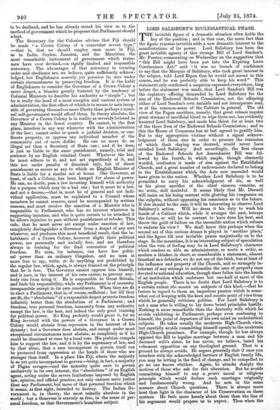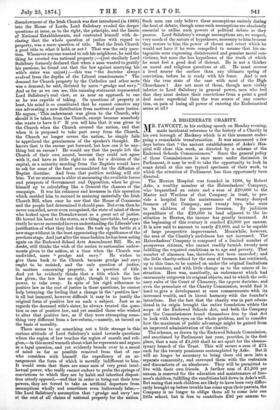LORD SALISBURY'S ECCLESIASTICAL PHASE.
adopt. THE invisible figure of a dramatic situation often holds the disendowment of the Irish Church was first introduced (in 1868) into the House of Lords, Lord Salisbury evaded the deeper questions at issue, as to the right, the principle, and the limits of National Establishments, and contented himself with de- claring that the whole question of justice with regard to property, was a mere question of title. Had the Irish Church a good title to what it held, or not f That was the only ques- tion. Whenever anyone wanted to rob his neighbour, he said the thing he coveted was national property ;—(just similarly Lord Salisbury formerly declared that when a man wanted to gratify his passions, he found out that the law against marrying his wife's sister was unjust) ;—this was "the doctrine always evolved from the depths of the Liberal consciousness." The demand for Church property by the Catholics and other sects was a demand, he said, dictated by mere " grudge and envy." And as far as we can see, this amazing statement represented Lord Salisbury's real view, or as near an approach to one as he was capable of taking. On questions of property at least, his mind is so constituted that he cannot conceive any one advocating a new distribution from motives of pure justice. He argues, This endowment was given to the Church, why should it be taken from the Church, except because somebody else wants to have it r If you tell him that it was given to the Church when the Church covered the nation, and that when it is proposed to take part away from the Church, the Church no longer covers the nation, he simply fails to apprehend the genuineness of the speaker's thought. He knows that is the excuse put forward, but how can it be any- thing but an excuse ? He would say that the people left the Church of their own accord, because they could not agree with it, and have as little right to ask for a division of the capital, as a minority seceding from the Baptists would have to ask for some of the fund accumulated for the diffusion of Baptist doctrine. And from that position nothing will stir him. Yet no statesman is abler at measuring the available forces and prospects of Government and Opposition, when he gives himself up to calculating like a General the chances of the campaign. It was his calmness and keenness in this operation which enabled him to succeed in maiming materially the Irish Church Bill, when once he saw that the House of Commons and the people had determined it should pass. But even then he never conceded, never even recognised, the state of mind of those who looked upon the Disendowment as a great act of justice. He bowed his head to the storm, as a thing inevitable, but appa- rently he never succeeded in even understanding the Liberals' own justification of what they had done. He took up the battle at a new stage without in the least appreciating the significance of the previous stage. And just after the same fashion he has been acting again on the Endowed School Acts Amendment Bill. He, no doubt, still thinks the wish of the nation to nationalise endow- ments given to the nation, at a time when the Church was undivided, mere " grudge and envy." He wishes to give them back to the Church because grudge and envy ought to be resisted, and the only question of justice, in matters concerning property, is a question of title. And yet he evidently thinks that a title which the law has given, the law has no right, though it may have the power, to take away. In spite of his rigid adherence to positive law as the root of justice in these questions, he cannot help betraying the feeling that a change in the ' positive law' is all but immoral, however difficult it may be to justify the original form of positive law on such a subject. Just so as regards the deceased wife's sister, he always treated the ques- tion as one of positive law, and yet assailed those who wished to alter that positive law, as if they were attempting some- thing very different from a law-reform,—namely, an inroad on the basis of morality.
There seems to us something not a little strange in this curious attitude of Lord Salisbury's mind towards questions where the region of law touches the region of morals and reli- gion,—in this moral warmth about what he represents and argues as a legal question, and yet evidently broods over in a mood of mind as far as possible removed from that of one who considers with himself the expediency of an ar- rangement the form of which is morally indifferent to him. It would seem that there are some men of very great intel- lectual power, who really cannot endure to probe the springs of convictions to which they are by habit and inherited disposi- tion utterly opposed,—and that in order to bring out their true powers, they are forced to take an artificial departure from assumptions wholly and sometimes even ludicrously false,— like Lord Salisbury's assumption that ' grudge and envy' are at the root of all claims of national property for the nation. Such men can only believe these assumptions entirely during the heat of debate, though some such assumptions are absolutely essential to utilise such powers of political debate as they possess. Lord Salisbury's strange assumptions are, we suspect, very much of the nature of hypotheses, necessary to him because they restore to him the power of thrust and retort which he would not have if he were compelled to assume that his an- tagonists were expressing disinterested and genuine moral con- victions, but none the less hypotheses of the truth of which he must feel a good deal of distrust. He is not a thinker on moral and religious questions at all. He must assume a level nearer the surface than any ultimate spring of conviction, before he is ready with his fence. And is not this the true state of the case with most of the High Churchmen Are not most of them, though men visibly inferior to Lord Salisbury in general power, men who feel that they must deduce their convictions from a point a good deal more superficial than the true source of any convic- tion, on pain of losing all power of entering the Ecclesiastical arena at all ?



































 Previous page
Previous page